About the Department
The Department of Electrical and Electronics Engineering, was started in the year 1992. It offers one under-graduate program (B.Tech.), two post-graduate programs (M.Tech in Power Systems and M.Tech. in Power Electronics & Drives) and also research programs (Ph.D.) in the various fields related to Electrical and Electronics Engineering to cater to the ever challenging needs of technical excellence in all areas of electrical engineering such as Integrated electronics and circuits, Tele-communications, Computer technology, Control & Automation, Power systems & Power electronics. The B.Tech (EEE) program is accredited by Accreditation Board for Engineering and Technology (ABET), USA.
The department is equipped with state-of-the-art facilities to carry out research work at all levels. The research focus of the department is in the area of power electronics, renewable energy systems, control systems, etc. The department also actively involved in multi-disciplinary research activities. The department has dedicated faculty, support staff, state-of-the-art teaching and research laboratories and is recognized for its excellence in research, teaching and service to the Nation.
The department provides healthy & competitive environment for all round development of students leading to several remarkable achievements in GATE, CAT, GRE, TOEFEL, PSUs etc. The faculties and students of EEE Department do present papers in National and International conferences. The department is also having a very good industry institute interaction through Consultancy, Training Program, Collaborative Research work, student’s project work etc.
Vision
The Department of Electrical Engineering will provide programs of the highest quality to produce world class engineers who can address challenges of the electrical energy needs supporting the latest technical research and development towards TANGEDCO, also to inculcate the excellent academic professionalism and uphold human values.
Mission
To provide a stimulating learning environment with a technological orientation to maximize the Individual potential by acquisition of high quality electrical and electronic engineering concepts through excellent practices in the latest and emerging technologies.
DM1: To educate our students and provide them with the skills they need to meet high standards of excellence in Electrical and Electronics engineering.
DM2: To prepare students for professional careers and advanced studies.
DM3: To teach in and outside the classroom using traditional, innovative methods and pass along knowledge through basic and applied research in Electrical and Electronics Engineering.
DM4: To Serve as a resource of Electrical and Electronics Engineering expertise at the regional, National and global levels.
Academics
Under Graduate The B.Tech. Degree curriculum has been designed to create professional electrical and electronic engineers, who can serve in the fields of core electrical engineering, information and communication systems, and other related fields.
Post Graduate In eee/Course PPT by staff JAN 2019, there is growing awareness that the future training and education of electrical engineers in the industry needs to be in the area of highly efficient, industry-relevant skills formation, to enable frequent and rapid deployment of professional skills in new areas. As a step in this direction, the postgraduate programs in power electronics & drives and in power systems were evolved.
Research Focus The Research of Electrical Engineering concentrates its activities on the analysis, synthesis and management of complex connected systems concerned with manipulating electromagnetic quantities. This is achieved by training highly qualified and academic people and by providing to the best of its ability new knowledge based on high quality research. The Department aims to make a contribution to society by stimulating an improvement in the quality of life in a general sense and by being a leading innovative force behind the economy.
Advantage We made students proficient in theory, modelling and software packages like MATLAB, Electrical CADD required to perform Electrical Engineering tasks related to High Voltage Design, Power Electronic Circuit Design, etc.
PO
PG – M.TECH – POWER SYSTEM
PROGRAMME OUTCOMES (PO)
The post graduates are able to,
PO1: Acquire in–depth knowledge and critically analyze problems in wider and global perspective for Power System Dynamics, Analysis etc.
PO2: An ability to use the techniques, skills, and modern tools necessary for Power System engineering practice
PO3: Carryout collaborative and multidisciplinary projects & research in the areas of FACTS, Smart Grid, Renewable energy resources etc.
PO4: An ability to work in a team to take up the challenges in the areas of, Power System Dynamics, Analysis, and Protection etc.
PO5: An ability to independently carry out research and development work to solve practical problems and to maintain lifelong learning and research by involving various professional activities.
UG – B. Tech – EEE
PROGRAMME OUTCOMES (POs)
On completion of B.Tech in Electrical and Electronics Engineering Programme, students
will have,
(a) An ability to apply knowledge of mathematics, science and engineering.
(b) An ability to design and conduct experiments in electrical and electronics engineering
as well as to analyze and interpret data.
(c) An ability to design electrical and electronics engineering system, component or
process to meet desired needs within realistic constraints such as economic,
environmental, social, political, ethical, health and safety, manufacturability, and
sustainability.
(d) An ability to function on multi-disciplinary teams.
(e) An ability to identify, formulate, and solve Electrical and Electronics Engineering
problems.
(e) An understanding of professional and ethical responsibility.
(f) An ability to communicate effectively.
(g) The broad education necessary to understand the impact of electrical and electronics
engineering solution in a global, economic, environmental and social context.
(h) A recognition of the need for, and an ability to engage in life-long learning.
(i) A knowledge of contemporary issues.
(j) An ability to use the techniques, skills, and modern tools necessary for electrical and
electronics engineering practice.
(l) The ability in understanding of the engineering and management principles and apply
them in project and finance management as a leader and a member in a team.
PSO
PG – M.TECH – POWER ELECTRONICS AND DRIVES
PROGRAM SPECIFIC OUTCOMES (PSOs)
PSO 1: Ability to design, experiment analyze and trouble shoot problems of the Power Electronic converters, inverters and drives.
PSO 2: To have a substantial knowledge in planning, operation and maintenance of Power Electronic Components and Drives for Industrial needs.
PG – M.TECH- POWER SYSTEM
PROGRAMME SPECIFIC OUTCOMES (PSO)
PSO 1: Ability to design, experiment analyze and trouble shoot problems in the areas of Power System Dynamics, Analysis, and Protection etc.
PSO 2: To have a substantial knowledge in planning, operation and management of FACTS, Smart Grid, Renewable energy allied power system components.
UG –B. Tech - EEE
PROGRAMME SPECIFIC OUTCOMES
PSO 1:The EEE program must demonstrate knowledge and hands-on competence in the application of circuit analysis and design, power system, associated software and applications, analog and digital electronics, and microcontrollers to the building, testing, operation, and maintenance of electrical/electronic(s) systems.
PSO 2: The EEE program must demonstrate that graduates can analyze, design, and implement control systems, instrumentation systems, power systems. They can apply project management techniques to electrical/electronic(s) systems.
PEO
P.G – M. Tech – POWER ELECTRONICS AND DRIVES
PROGRAM EDUCATIONAL OBJECTIVES (PEO)
PEO1: To enable the students to have success of career in industry, research and teaching with fundamental and advanced knowledge and skills in power electronics engineering.
PEO2: To innovate and contribute in power Electronics engineering to solve engineering problems in the areas of, modelling, analysis and control of power electronic and drive systems.
PEO3: To demonstrate collaborative professionalism and multi-disciplinary approach with effective communication and managerial skills and provide acceptable solution for the real life problems in power electronics.
P.G - M.TECH - POWER SYSTEM
PROGRAMME EDUCATIONAL OBJECTIVES (PEOs)
PEO1: To enable the students to have success of career in industry, research and teaching with fundamental and advanced knowledge and skills in power System engineering.
PEO2: To innovate and contribute to solve engineering problems in the areas of, Power System Dynamics, Analysis, and Protection etc.
PEO3: To demonstrate collaborative professionalism and multi- disciplinary approach with effective communication and managerial skills and provide acceptable solution for the real life problems in the field power System.
U.G – B. Tech – EEE
PROGRAMME EDUCATIONAL OBJECTIVES (PEOs):
PEO1: PREPARATION
TElectrical Engineering Graduates are in position with the knowledge of Basic Sciences in general and Electrical Engineering in particular so as to impart the necessary skill to
analyze and synthesize electrical circuits, algorithms and complex apparatus.
PEO2: CORE COMPETENCE
TElectrical Engineering Graduates have competence to provide technical knowledge, skill and also to identify, comprehend and solve problems in industry, research and academics
related to power, information and electronics hardware.
PEO3: PROFESSIONALISM
TElectrical Engineering Graduates are successfully work in various Industrial and Government organizations, both at the National and International level, with professional
competence and ethical administrative acumen so as to be able to handle critical situations
and meet deadlines.
PEO4: SKILL
Electrical Engineering Graduates have better opportunity to become a future researchers/scientists with good communication skills so that they may be both good team-members
and leaders with innovative ideas for a sustainable development.
PEO5: ETHICS
Electrical Engineering Graduates are framed to improve their technical and intellectual capabilities through life-long learning process with ethical feeling so as to become good
teachers, either in a class or to juniors in industry.
LAB DETAILS
The infrastructure and lab facilities are upgraded from time to time and provide adequate opportunities for students and researchers to learn and innovate
The following State of Art Laboratory is available in EEE Department
ELECTRICAL MACHINES LAB: ELECTRICAL MACHINES-I & II

Machines-I Laboratory is to expose the students to the operation of D.C. machines and transformers and give them Experimental skill.
Machines-II Laboratory is to expose the students to the concepts of synchronous and asynchronous machines and analyze their performance.
Also impart knowledge on Construction and performance of salient and non – salient type synchronous generator, Principle of operation and performance of synchronous motor, Construction, principle of operation and performance of induction machines, Starting and speed control of three-phase induction motors, Construction, principle of operation and performance of single phase induction motors and special machines. This lab consists of machines such as reluctance machine, induction motor, induction generator, alternators, synchronous motors etc., all mounted in industrial type of assembly to give the students industrial feel.
ANALOG ELECTRONIC CIRCUITS LABORATORY

This lab is intended to give the students a practical experience in working with semiconductor devices such as junction diodes, bipolar junction transistors (BJTs), MOS field effect transistors (MOSFETs) and op-amps, and examines the design and operation of important circuits that utilize these devices. This laboratory integrates the theory taught in the basic course and helps the students to apply their knowledge of electronic circuits. An additional objective is to provide some practice and experience with relevant software tools for electronic circuit simulation.
Digital Electronics lab
Digital laboratory is to enhance the practical knowledge on Digital Electronics. This laboratory will enable the undergraduate students to learn the basic concepts and techniques in digital electronic circuits and systems. The learning objective of this laboratory is to supplement the theory course of digital circuits and systems with adequate introduction to both combinatorial and sequential logic circuits, such as, adders, subtractors, comparator, multiplexer/demultiplexer, encoders/decoders, 7-segment display and decoder/driver, flip-flop, register, counter, etc. and various combinations.
Measurement and Instrumentation Lab
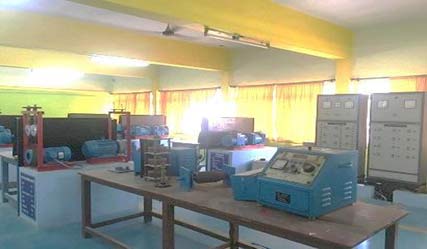
Measurement and Instrumentation laboratory is very important for the basic knowledge and has the objective to familiarize the student with the operation of basic instrumentation such as Energy meter, multimeter, oscilloscopes, signal generators etc. also learn to calibrate the meters, verify theorems, and understand hysteresis characteristics & other important concepts related to measurement. Major Equipment in Measurement and instrumentation Lab are LVDT (Linear Variable differential transformer), Thermocouple, Bourdon type pressure gauge, Resistance strain gauge, Pneumatic Pressure gauge, optical devices, phase shifting transformers, bridge circuits and induction coil etc.
POWER ELECTRONICS LAB
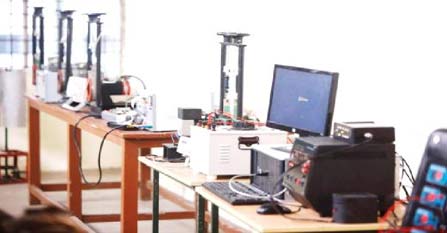
The power electronics lab enhances the EEE students by providing them the better understanding of the concepts and working of advanced power semiconductor devices and power electronics circuits. Student will expose to the characteristics of different types of power electronic devices, analyze the operation of controlled rectifiers, choppers, inverters, AC to AC converters and applications of power electronic circuits.
MICROPROCESSOR AND MICROCONTROLLER LAB
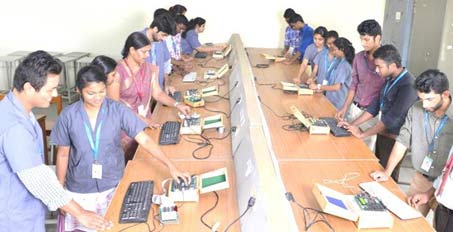
Microprocessors and Microcontrollers laboratory helps the students to develop their knowledge on processor architecture and the programming skills. This laboratory houses the hardware which includes 8085 Microprocessor trainer kits, 8086 Microprocessor trainer kits, 8051 Microcontroller trainer kits, interfacing cards etc. This laboratory provides hand-on experience to interface I/O devices, A/D and D/A conversions, traffic light control system etc., The features and facilities available in this laboratory helps the students to do their projects and enhance their knowledge on the latest trends and technologies.
BASIC ELECTRICAL AND ELECTRONICS LAB
The basic Electrical and Electronics laboratory is utilized for performing experiments related to fundamentals of Electrical and Electronics Engineering, common to all first year undergraduate students.
CONTROL SYSTEM LAB
The Control Systems Lab in which the students perform a series of experiments in controls. Laboratory experiments are aimed at elucidating the principles governing feedback control systems and providing familiarity with the characteristics and limitations of real control devices. Matlab and Simulink will be used to design, test and implement control algorithms for a variety of experiments. Introductory experiments on response of control system components, Open-loop and closed-loop (feedback) response of servo systems, Simulation of systems on computer, Proportional-Integral-Derivative controllers’ etc are the major skill development experiment involved in this lab.
RESEARCH LAB & FACILITIES
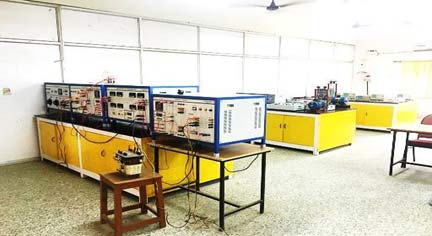
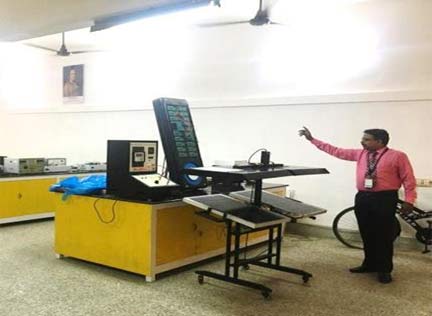
We continually invest in resources, and improve research facilities to ensure that our academic staff and doctoral researchers are able to pursue their ideas, undertake research and transfer their knowledge to
ensure significant global impact.
The department of EEE has excellent facilities to carry out research work in all the areas of Electrical Engineering. The R&D laboratory has been set up to utilize the research potential of the students and thereby to bring out the research publications. This lab is fortified with state of the art equipment like,
- ✔ ECO Sense Insight -Solar Module.
- ✔ Solar Panel Installed at Terrace For Research Purpose.
- ✔ HVDC Transmission Line Analyzer.
- ✔ Orcad Version SPB 17.2( 5 Users pakage) HPST ID 0024E8522A4A OrCad ® PCB Design University Edition LAB VIEW 2017 packages 25 users ademic site license research standard service Program Etap 16.1 Version 10 user pakage.
| BOARD OF STUDIES | |
|---|---|
| Name | Designation |
| Dr. S.Prakash, Prof & Head(eee/Course PPT by staff JAN 2019) | Chairman |
| Internal Members | |
| Dr.T.Saravanan,Professor & Head(ECE & ETC) | Member |
| Dr.Kaliamoorthy,Professor & Head(CSE) | Member |
| Dr.Raja,Professor & Head(Mech) | Member |
| Ms.V.Jayalakshmi,Asst. Professor(eee/Course PPT by staff JAN 2019) | Member |
| Mr.P.Ramanathan,Asst. Professor(eee/Course PPT by staff JAN 2019) | Member |
| External Members | |
| Dr.Srinivasan, Professor& Head, Tagore Engg College,Chennai | Member-Academic Expert |
| Dr.L.R.Rajagopalan, Chairman SANDS Instrumentation Pvt Limited,Chennai. | Member-Industrial Expert |
| Under graduate Programmes Offered |
| B.Tech Electrical & Electronics Engineering |
| PEOs |
| POs / SOs |
| Mission Vs PEOs Mapping |
| PEOs Vs POs Mapping |
| Credit Table |
| Curriculum & Syllabus |
| Curriculum Chart |
| Curriculum Table |
| Curriculum Vs PEO's Mapping |
| Curriculum Vs PO's Mapping |
| Pre-Requisite & Co-Requisite Table |
| Post graduate Programmes Offered |
| M.Tech Power Electronics and Drives |
| PEOs |
| POs / SOs |
| Curriculum & Syllabus |
| Curriculum Chart |
| Curriculum Table |
| M.Tech Power Engineering and Management |
| PEOs |
| POs / SOs |
| Curriculum & Syllabus |
| Curriculum Chart |
| Curriculum Table |
Events
INTERNATIONAL CONFERENCE
| Date | Events Details |
|---|---|
| 25-26 Apr 2019 | Challenges and Opportunities towards Sustainable Future |
| 20-21 Dec 2018 | Intelligent Energy and Power System Management |
NATIONAL CONFERENCE
| Date | Events Details | Resource Person |
|---|---|---|
| 17-18-May-2019 | Intelligent Fault Tolerant Control Technique For HT Transmission system | |
| 30-31-Jan-2019 | Optimization of Smart Grid Energy Systems | |
| 26-Oct-2018 | Recent Trends in Power System and Grid Connected Micro Generation Systems (Submitted for ISBN ,Application reference number Vol 1: 10281 Vol2: 10114) |
Er.S K Mohammed Aslam GM, Ohm Energy Management, Chennai Dr.J.Gayathri Monica, Professor/Adhi College of Engineering. |
| 26-27-Sep-2018 | Grid Connected Micro Generation Systems |
SEMINAR
| Date | Events Details | Resource Person |
|---|---|---|
| 3-4-2019 | SCADA and Power System Automation | |
| 5-3-2019 | Protection Scheme for Substation Equipment | |
| 5-2-2019 | Bio Medical Instrumentation | |
| 26-9-2018 | Robotic and Automation | |
| 3-10-2018 | Energy demand management system | |
| 5-9-2018 | Challenges on future energy sources | |
| 14-8-2018 | MATLAB applications to Power System | Dr.S.Ramareddy, Professor eee/Course PPT by staff JAN 2019, Jerusalem College of Engineering, Chennai. |
| 14-8-2018 | Power Electronics Projects Design | Er.R. Sridhar, TRIOS Technologies PVT, Chennai |
WORKSHOP
| Date | Events Details | Resource Person |
|---|---|---|
| 19-3-2019 | Hardware design using ARDUINO Controller | |
| 19-2-2019 | Embedded Systems | |
| 17-10-2018 | Distributed control systems for generating Stations | |
| 10-10-2018 | Electronics System Design | Er. Ezhilarasan,TAPCO Pneumatic, Chennai |
| 21-8-2018 | PLC and SCADA automation | Er.Rajesh Raman ProGyaan Automation,chennai |
FACULTY DEVELOPMENT PROGRAM
| Date | Events Details |
|---|---|
| 29 May 2019 | Advanced Control System |
| 26 Nov 2018 | Distributed Generation and Micro Grid |
GUEST LECTURE
| Date | Events Details | Resource Person |
|---|---|---|
| 15-4-2019 | Design of BUCK converter AVR | |
| 9-4-2019 | Instruments and Control system for renewable energy systems in the present scenario | |
| 27-3-2019 | Power System operation and control | |
| 13-3-2019 | Power Quality issues in power system | |
| 27-2-2019 | Cyber Security | |
| 3-2-2019 | High Voltage DC Transmission | |
| 23-10-2018 | Industrial Automation | |
| 9-10-2018 | Embedded System Design | |
| 29-9-2018 | An Introduction and New Trends, Research Scope In Control Systems | Prof.Dr.Giovanni Palmieri, Senior Researcher of Automatic Control, University of Sannio, Benevento, Italy. |
| 25-9-2018 | Soft Skill Development Career Launcher | Chennai |
| 19-9-2018 | Power System Management | |
| 18-9-2018 | Career Development Program | Mr.Venther Venthan ,CDC,BIHER |
| 11-9-2018 | An over view of Advanced Power Electronics and Applications | |
| 30-8-2018 | Power system &Power Lines Protection | Dr.Arulalan, Professor/eee/Course PPT by staff JAN 2019, Indra Institute of Technology |
| 29-8-2018 | Modern Control System | |
| 14-8-2018 | Renewable System Design |
INDUSTRIAL VISIT
| Date | Events Details |
|---|---|
| 05-04-2019 | Sunguvarchattiram 440KV substation, Chennai. |
| 20-03-2019 | Neyveli Lignite Corporation India Ltd. |
| 15-02-2019 | North Chennai Thermal Power Plant, Athipattu, Chennai. |
| 02-11-2018 | CET power Solutions, Chennai |
| 01-11-2018 | North Chennai Thermal Power Station, Athopattu, Chennai Third Year |
| 22-10-2018 | Power Load Dispatch center, Chennai |
| 04-10-2018 | Maraimalai nagar 110kv substation, TNEB Second Year& Third Year |
| 27-09-2018 | Relay Testing, Maraimalai Nagar Substation, TNEB |
CORPORATE TRAINING PROGRAM
| Date | Title | Resource Person |
|---|---|---|
| 4-10-18 & 5 -10-18 | skill development( For Final year) | Global talent track private Ltd.,Chennai |
| STUDENTS STRENGTH | |
|---|---|
| Batch | Number of Students Enrolled |
| 2011 – 2015 | 145 |
| 2012 – 2016 | 78 |
| 2013 - 2017 | 69 |
| 2014 – 2018 | 60 |
| 2015 – 2019 | 21 |
| 2016 – 2020 | 22 |
| 2017 – 2021 | 46 |
| FACULTY DETAILS | ||
|---|---|---|
| S.No | Name of the staff | Designation |
| 1. | Dr.S.Prakash | Professor |
| 2. | Dr.J.Shanmugam | Professor |
| 3. | Dr.T.R.Rangaswamy | Professor |
| 4. | Dr.R.Hari Prakash | Professor |
| 5. | Dr.V.Jayalakshmi | Professor |
| 6. | Dr. S.P.Vijayaragavan | Associate Professor |
| 7. | Mr.K.S.S.Prasad | Associate Professor |
| 8. | Mr.K.Lingeswaran | Associate Professor |
| 9. | Ms.Anitha Sampath Kumar | Associate Professor |
| 10. | Ms.S.Sherine | Associate Professor |
| 11. | Mr.K.Sakthivel | Associate Professor |
| 12. | Mr.S.Uma Mageswaran | Associate Professor |
| 13. | Ms.V.Sumathi | Associate Professor |
| 14. | Mr.D.Purushothaman | Associate Professor |
| 15. | Mr.S.Dinakar Raj | Associate Professor |
| 16. | Mr.P.Kathiravan | Associate Professor |
| 17. | Ms.R.Rathika | Assistant Professor |
| 18. | Ms.Arthisuriya | Assistant Professor |
| 19. | Ms.K.Venkateswari | Assistant Professor |
| 20. | Ms.S.Divya | Assistant Professor |
| 21. | Mr.K. Dwarakesh | Assistant Professor |
| 22. | Mrs.R.Sathya Priya | Assistant Professor |
| 23. | Mrs.G.Hemavathi | Assistant Professor |